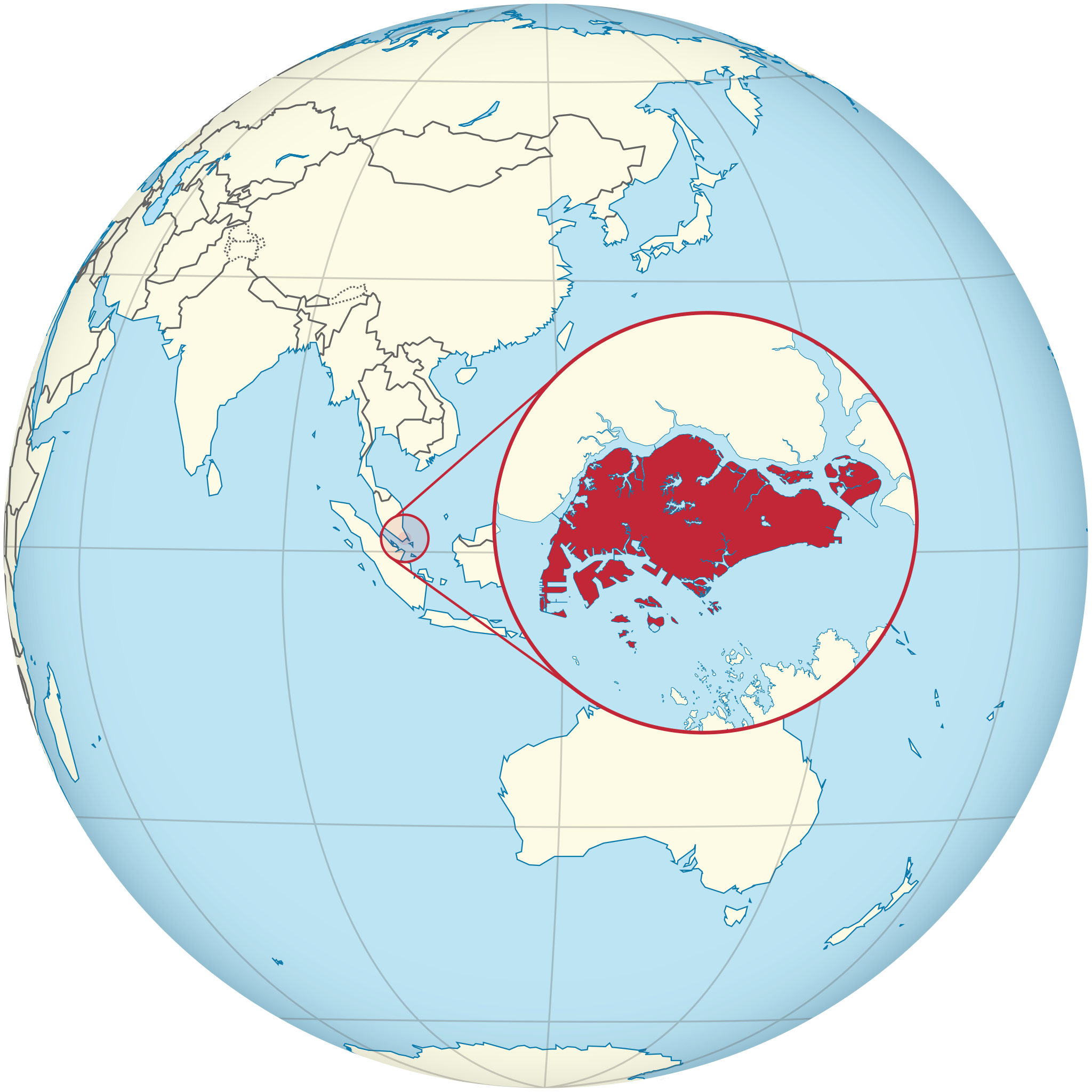More languages
More actions
(Created) Tag: Visual edit |
BenWelkins (talk | contribs) No edit summary Tag: Visual edit |
||
| (4 intermediate revisions by 2 users not shown) | |||
| Line 1: | Line 1: | ||
{{Infobox country|name=Republic of Singapore|native_name=新加坡共和国<br>Republik Singapura<br>சிங்கப்பூர் குடியரசு|mode_of_production=[[Capitalism]]|image_map=Singapore map.png|map_width=290|official_languages=Chinese<br>English<br>Malay<br>Tamil|area_km2=733.1|population_estimate=5,453,600|population_estimate_year=2021}} | {{Infobox country|name=Republic of Singapore|native_name=新加坡共和国<br>Republik Singapura<br>சிங்கப்பூர் குடியரசு|image_flag=Flag of Singapore.svg|image_coat=Coat of arms of Singapore.svg|mode_of_production=[[Capitalism]]|image_map=Singapore map.png|map_width=290|official_languages=Chinese<br>English<br>Malay<br>Tamil|area_km2=733.1|population_estimate=5,453,600|population_estimate_year=2021}} | ||
'''Singapore''', officially the '''Republic of Singapore''', is a city-state in Southeast Asia. | '''Singapore''', officially the '''Republic of Singapore''', is a liberal democratic city-state in Southeast Asia. It has no natural resources and relies on foreign trade.<ref name=":12222">{{Citation|author=[[Vijay Prashad]]|year=2008|title=The Darker Nations: A People's History of the Third World|chapter=Singapore|page=|pdf=https://cloudflare-ipfs.com/ipfs/bafykbzaceascnzh26r5d6uitjjs2z7rflhaxlt7rboz5whzdf76qg6xxvecqq?filename=%28A%20New%20Press%20People%27s%20history%29%20Vijay%20Prashad%20-%20The%20darker%20nations_%20a%20people%27s%20history%20of%20the%20third%20world-The%20New%20Press%20%282008%29.pdf|publisher=The New Press|isbn=9781595583420|lg=https://libgen.rs/book/index.php?md5=9B40B96E830128A7FE0E0E887C06829F}}</ref><sup>:254</sup> | ||
== History == | == History == | ||
[[Li Guangyao]] of the [[People's Action Party]] won Singapore's elections in 1959. In 1963, he began suppressing the [[Malayan Communist Party]] and [[trade union]] leaders. | |||
=== British colonization === | |||
The [[United Kingdom of Great Britain and Ireland (1801–1922)|British]] seized Singapore in 1819 to use as a base for trading with [[Qing dynasty (1636–1912)|China]]. The Second World War severely damaged Singapore.<ref name=":1222">{{Citation|author=[[Vijay Prashad]]|year=2008|title=The Darker Nations: A People's History of the Third World|chapter=Singapore|page=|pdf=https://cloudflare-ipfs.com/ipfs/bafykbzaceascnzh26r5d6uitjjs2z7rflhaxlt7rboz5whzdf76qg6xxvecqq?filename=%28A%20New%20Press%20People%27s%20history%29%20Vijay%20Prashad%20-%20The%20darker%20nations_%20a%20people%27s%20history%20of%20the%20third%20world-The%20New%20Press%20%282008%29.pdf|publisher=The New Press|isbn=9781595583420|lg=https://libgen.rs/book/index.php?md5=9B40B96E830128A7FE0E0E887C06829F}}</ref><sup>:249</sup> | |||
[[Li Guangyao]] of the [[People's Action Party]] won Singapore's elections in 1959. In 1963, he began suppressing the [[Malayan Communist Party]] and [[trade union]] leaders.<ref name=":0" /> | |||
=== Independence === | |||
Singapore became independent in 1965.<ref name=":1222" /><sup>:247</sup> It gave major tax incentives to foreign companies starting in 1967. It abolished quotas and [[Tariff|tariffs]] in 1973.<ref name=":1222" /><sup>:253</sup> | |||
Li banned the [[Left-wing politics|leftist]] [[Singapore Association of Trade Unions]] and promoted the [[National Trades Union Congress]]. The NTUC began establishing [[Worker cooperative|cooperatives]] in the 1970s, and the powers of trade unions were limited in 1982.<ref name=":0">{{Web citation|author=Ravi Chandren|newspaper=The Socialist|title=Singapore: A historical background|date=2006-06-26|url=https://thesocialist.org.au/singapore-a-historical-background/|archive-url=https://web.archive.org/web/20201031125420/https://thesocialist.org.au/singapore-a-historical-background/|archive-date=2020-10-31|retrieved=2022-09-11}}</ref> Between 1978 and 1997, Singapore only had two [[Strike action|strikes]].<ref name=":1222" /><sup>:253</sup> | |||
== Economy == | |||
From 1965 to 1990, Singapore's GDP grew by an average of 6.5% per year. Manufacturing grew from 7.2% to more than 75% of exports between 1960 and 1990, but this growth mainly only benefitted the [[Bourgeoisie|ruling class]], which made up 3% of the population.<ref name=":1222" /><sup>:246</sup> | |||
== References == | == References == | ||
[[Category:Countries]] | [[Category:Countries]] | ||
[[Category:Asian countries]] | |||
Latest revision as of 03:31, 29 October 2024
| Republic of Singapore 新加坡共和国 Republik Singapura சிங்கப்பூர் குடியரசு | |
|---|---|
 | |
| Official languages | Chinese English Malay Tamil |
| Dominant mode of production | Capitalism |
| Area | |
• Total | 733.1 km² |
| Population | |
• 2021 estimate | 5,453,600 |
Singapore, officially the Republic of Singapore, is a liberal democratic city-state in Southeast Asia. It has no natural resources and relies on foreign trade.[1]:254
History[edit | edit source]
British colonization[edit | edit source]
The British seized Singapore in 1819 to use as a base for trading with China. The Second World War severely damaged Singapore.[2]:249
Li Guangyao of the People's Action Party won Singapore's elections in 1959. In 1963, he began suppressing the Malayan Communist Party and trade union leaders.[3]
Independence[edit | edit source]
Singapore became independent in 1965.[2]:247 It gave major tax incentives to foreign companies starting in 1967. It abolished quotas and tariffs in 1973.[2]:253
Li banned the leftist Singapore Association of Trade Unions and promoted the National Trades Union Congress. The NTUC began establishing cooperatives in the 1970s, and the powers of trade unions were limited in 1982.[3] Between 1978 and 1997, Singapore only had two strikes.[2]:253
Economy[edit | edit source]
From 1965 to 1990, Singapore's GDP grew by an average of 6.5% per year. Manufacturing grew from 7.2% to more than 75% of exports between 1960 and 1990, but this growth mainly only benefitted the ruling class, which made up 3% of the population.[2]:246
References[edit | edit source]
- ↑ Vijay Prashad (2008). The Darker Nations: A People's History of the Third World: 'Singapore'. [PDF] The New Press. ISBN 9781595583420 [LG]
- ↑ 2.0 2.1 2.2 2.3 2.4 Vijay Prashad (2008). The Darker Nations: A People's History of the Third World: 'Singapore'. [PDF] The New Press. ISBN 9781595583420 [LG]
- ↑ 3.0 3.1 Ravi Chandren (2006-06-26). "Singapore: A historical background" The Socialist. Archived from the original on 2020-10-31. Retrieved 2022-09-11.


